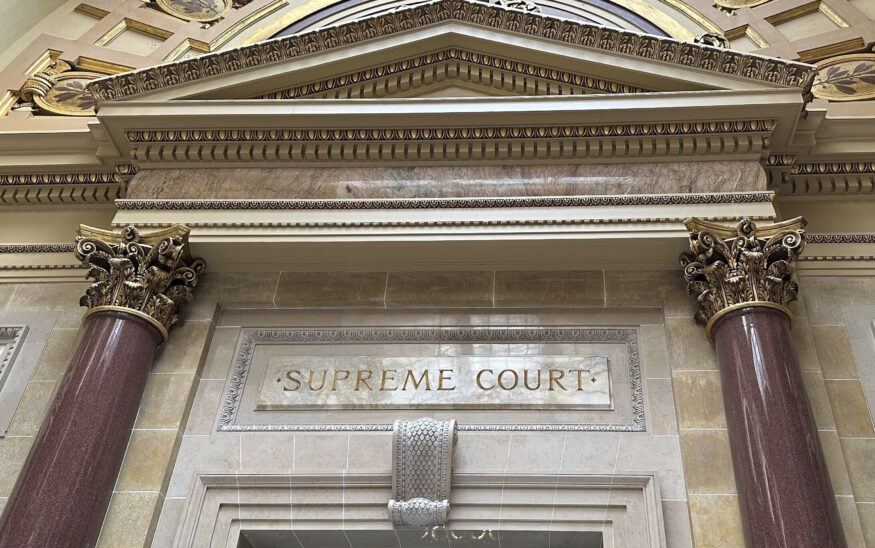Supreme Court: Abortion protester’s First Amendment rights violated
By: MaryBeth Matzek, Special to the Wisconsin Law Journal//July 3, 2024//
Supreme Court: Abortion protester’s First Amendment rights violated
By: MaryBeth Matzek, Special to the Wisconsin Law Journal//July 3, 2024//
An injunction barring an anti-abortion protester from coming near a Planned Parenthood nurse violated his First Amendment freedom of speech rights and must be overturned, according to a June 27 Wisconsin Supreme Court ruling.
In 2020, a Trempealeu County judge barred Brian Aish from being near nurse practitioner Nancy Kindschy, who worked in a small family planning clinic in Blair. Kindschy said Aish threatened her, saying bad things would happen to her or her family if she did not quit her job. Aish argued his statements, which were made from a public sidewalk, were protected under the First Amendment.
Between 2014 and 2019, Aish regularly protested at the clinic (which has since closed), primarily holding signs quoting Bible verses and preaching his Christian and anti-abortion beliefs, according to court records. In 2019, he began directing his comments to Kindschy, which she viewed as threatening.
According to court documents, Aish told Kindschy that “it won’t be long before bad things will happen to you and your family” and that “you could get killed by a drunk driver tonight.”
The Trempleau County judge issued a four-year injunction barring Aish from being near Kindschy. Aish appealed the decision with the appeals court upholding the injunction. The Supreme Court voted unanimously to reverse that decision, saying the injunction should be dismissed.
A decision by the U.S. Supreme Court played a pivotal role in the Wisconsin Supreme Court’s argument for reversal.
The U.S. Supreme Court issued a ruling in 2023 making it more difficult to convict a person of making a violent threat. In that case (Counterman), a Colorado man was convicted of stalking a musician. The nation’s top court said prosecutors must show “the defendant had some subjective understanding of the threatening nature of his statements” and that “the defendant consciously disregarded a substantial risk that his communications would be viewed as threatening violence.”
In Kindschy’s argument that Aish’s comments were not protected free speech, she said “the injunction is nonetheless constitutional because Aish’s statements were true threats and were thus unprotected by the First Amendment,” according to court records.
In response, the Wisconsin Supreme Court looked to the Counterman ruling saying even if Aish’s comments were true threats (which they did not discuss) that “the harassment injunction still violates the First Amendment because the circuit court did not make the necessary finding that Aish ‘consciously disregarded a substantial risk that his communications would be viewed as threatening violence.’”
Recognizing the role that the U.S. Supreme Court decision would have on her case, Kindschy’s attorneys said since a civil harassment injunction was sought versus a criminal charge, the requirements set out in the Counterman case did not apply. In court documents, Kindschy contended the Counterman case did not “explicity expand its holding” beyond the criminal prosecution at issue in that case and that the intent to harass requirement in Wisconsin state statutes “always satisfies Counterman’s recklessness standard.”
The court rejected both arguments — “we hold that Counterman applies to civil harassment injunctions premised on true threats.”
Following the Supreme Court’s ruling, Aish’s attorney, Joan Mannix with the Thomas More Society, said the ruling “reaffirms that the First Amendment protects speech, even unpopular or disfavored speech — a fact that is often lost in these partisan times.”
The Associated Press contributed to this report.
Legal News
- Survey: Harris has enough delegates to be nominee
- Outside the RNC, small Milwaukee businesses and their regulars tried to salvage a sluggish week
- Biden called to resign immediately after the president announces he won’t seek reelection
- Biden drops out of 2024 presidential race, endorses Harris
- Local PA cops allegedly thought Trump’s would-be assassin was Secret Service
- Biden-Lead Secret Service admits agency denied past requests by Trump’s campaign for tighter security
- Class action filed against Walgreens
- Former Waukesha County Sheriff’s Office lieutenant pleads guilty to smuggling contraband
- Two dead, one injured after Ozaukee County water rescue
- RNC Final Day: Trump accepts GOP Nomination
- Wisconsin officials intervene in Planned Parenthood action
- 7th Circuit adopts modifications to Rules 31, 34, 40, 47 and 60
Case Digests
- Ineffective Assistance of Counsel; Double Jeopardy; Sentencing
- Ineffective Assistance of Counsel; Sexual Assault-Prosecutorial Misconduct
- Contract-Negligence
- Criminal Law; Juvenile Law; Discovery
- Family Law; Child Support; Property Division First paragraph(s)
- Ineffective Assistance of Counsel- Exclusion of Evidence of Witness Bias
- Postconviction Relief-Sentencing-Ineffective Assistance of Counsel
- 14th Amendment – Due Process
- Criminal-Sentencing Guidelines – Enhancement
- Bankruptcy-Tax
- Civil Rights – 14th Amendment-Jury Instructions
- Contract; Foreclosure and Property












